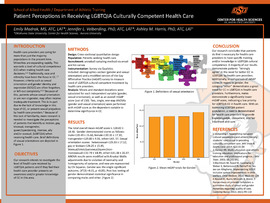| dc.contributor.author | Madrak, Emily | |
| dc.contributor.author | Volberding, Jennifer L. | |
| dc.contributor.author | Harris, Ashley M. | |
| dc.date.accessioned | 2020-05-05T19:37:49Z | |
| dc.date.available | 2020-05-05T19:37:49Z | |
| dc.date.issued | 2020-02-28 | |
| dc.identifier | ouhd_madrak_patientperceptionsinreceiving_2020 | |
| dc.identifier.citation | Madrak, E., Volberding, J. L., & Harris, A. M. (2020, Feb. 28). Patient perceptions in receiving LGBTQIA culturally competent health care. Poster presented at Research Day at Oklahoma State University Center for Health Sciences, Tulsa, OK. | |
| dc.identifier.uri | https://hdl.handle.net/11244/324221 | |
| dc.description.abstract | Background: There is a large amount of documented evidence demonstrating that health care providers are caring for diverse populations. This warrants a level of cultural competence (CC) when making health care decisions. Traditionally, Race and ethnicity have been the focus in CC. However, criteria such as sexual orientation and gender identity are often forgotten, or left out altogether. Because of this, patients whose sexual orientation or gender is a minority, may often receive inadequate treatment. This is in part due to the health care providers lack knowledge in this type of CC or present sexual prejudices. Because of this, research is needed to investigate the perceptions of patients that identify as lesbian, gay, bisexual, transgender, queer/questioning, intersex, ally (LGBTQIA) when receiving health care. | |
| dc.description.abstract | Methods: Cross-sectional design consisting of 140 participants (male=78, female=50, transgender=5, other=7; heterosexual=16, gay/lesbian=72, bisexual=43, other=9, mean age=26.97 ± 7.67). Participants were recruited using a snowball sampling method via email and list-serves. A modified version of the Gay Affirmative Practice (GAP) (reliability a = 0.962), was delivered online to participants to determine need of LGBTQIA cultural competent treatment by health care providers. Means and standard deviations were calculated for each variable (gender, sexual orientation), as well as an overall GAP score (out of 150). Two, single one-way ANOVAs (gender and sexual orientation) were performed with GAP score as the dependent variable. | |
| dc.description.abstract | Results: Calculated GAP scores: All=128.82 ± 18.48, male=128.49 ± 15.60, female=130.35 ± 17.10, transgender=129.80 ± 9.31, other=143. 57, heterosexual=129.33 ± 17.12, gay or lesbian=128.25 ± 15.85, bisexual/omni/pansexual/queer/non-monosexual=132.79 ± 14.99, other=131.38 ± 20.37. ANOVA results were modified with Kruskal-Wallis adjustments due to violation of normality and homogeneity of variance, and now are represented by Chi Squares. Gender was the single significant outcome, (X2(3) =8.01, p <0.05). Post hoc testing of gender demonstrated statistical significant in comparing males vs. other. | |
| dc.description.abstract | Conclusions: Patients do find it necessary for health care providers to have specific training and/or knowledge in LGBTQIA CC. A majority of results demonstrate strongly agree that health care providers need better CC in LGBTQIA. In comparison of GAP scores in gender, the category of other demonstrates a great need for CC in LGBTQIA in health care providers. Males demonstrated a much lower score, indicating a low priority for LGBTQIA CC in health care. With an increasing LGBTQIA patient population, patients feel the ever increasing need for health care providers to provide knowledgeable, competent, and fair treatment/care. | |
| dc.format | application/pdf | |
| dc.language | en_US | |
| dc.publisher | Oklahoma State University Center for Health Services | |
| dc.rights | The author(s) retain the copyright of have the right to deposit the item giving the Oklahoma State University Library a limited, non-exclusive right to share this material in its institutional repository. Contact Digital Resources and Discovery Services at lib-dis@okstate.edu or 405-744-9161 for the permission policy on the use, reproduction or distribution of this material. | |
| dc.title | Patient perceptions in receiving LGBTQIA culturally competent health care | |
| osu.filename | ouhd_madrak_patientperceptionsinreceiving_2020.pdf | |
| dc.type.genre | Presentation | |
| dc.type.material | Text | |
| dc.subject.keywords | multiculturalism | |
| dc.subject.keywords | diversity | |
| dc.subject.keywords | patient perceptions | |
| dc.subject.keywords | lgbtqia | |
| dc.subject.keywords | health care | |
